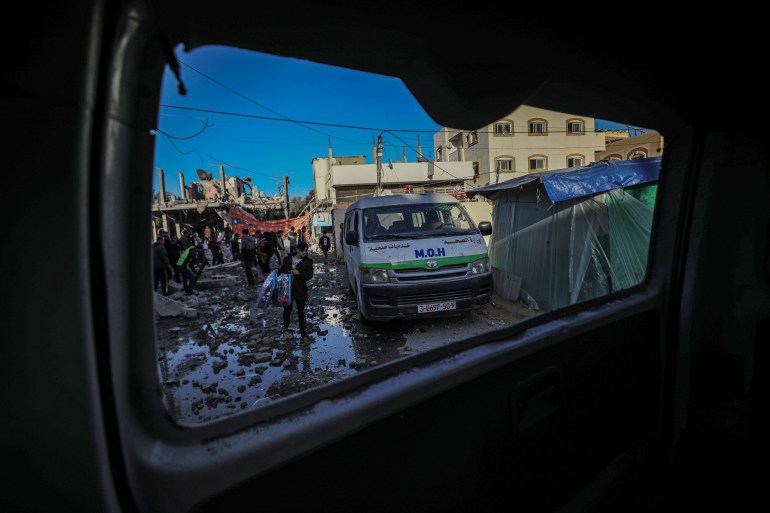Then unmanned Israeli quadcopters started shooting at anything that moved outside the building, sending the tens of thousands of families scrambling to dismantle their tents and flee for their lives.
Israeli tanks had reached the entrance to the Maghazi refugee camp by then, and the Israeli army had announced that the vicinity of the hospital had become a theatre of operations.
There would be no safety inside the medical facility for the tens of thousands sheltering there, they had to start fleeing for their lives, to get themselves and their families to safety.
Mounds of belongings appeared outside the hospital as people struggled to find vans, cars or even donkey carts to carry their essentials away.
Bedding, dismantled tents, clothing, mats, and children’s backpacks, were piled up, each family’s things kept together.

Some families had taken hospital beds, likely because their loved one was a patient there who would still need it when they arrived somewhere safe.
Not all the patients were able to leave the hospital, some were too ill or injured to move, while others did not have their families with them to help them on what was sure to be a dangerous road.
To take care of them, some doctors stayed behind, like Ismail Jabr, a fifth-year medical student whose family lived around the hospital and who had decided to keep coming to the hospital, he told Al Jazeera.
“I come here every day to see if I can help. I’ve been working with the orthopaedic department since day one.
“A lot of doctors left to get their families to safety, so yesterday there was just me and five doctors. Together, we had to run the orthopaedic department, the operating rooms, the in-patient department and the emergency room. We had no supplies, we worked without morphine.
“We were just doing what the people of Gaza do, we’re stubborn people and just keep doing what we can.”
The hubbub continued around Jabr, and he excused himself to go tend to a patient.
Nurse Mohamed al-Hams was also among the team that stayed.
“I sent my family away but stayed to support however I could. It’s so terrible here, my conscience wouldn’t let me leave these people behind and go.
“I went through the same thing in al-Shifa, I had to evacuate from there and leave the patients behind and I don’t know what happened with them.
“I can’t do that again, I can’t just leave my patients again.”

Mere hours later, an Israeli attack hit a home just metres from the hospital’s western gate, spreading even more terror among the displaced people around the hospital.
Eight people died and about 30 others were injured in the attack.
